- Hey Dullblog Online Housekeeping Note - May 6, 2022
- Beatles in the 1970s: Melting and Crying - April 13, 2022
- The Beatles, “Let It Be,” and “Get Back”: “Trying to Deceive”? - October 22, 2021
“Imagine” is already the most well-examined John Lennon album, but the new A&E documentary Above Us Only Sky is well worth watching. Here’s the network’s description:
“This special traces the untold story of the making of John Lennon’s 1971 album “Imagine.” Utilizing never-before-seen footage of Lennon and Ono from their private archive, the special delves into the depth of the creative collaboration between the couple and explores how the art, politics and music of the pair are intrinsically entwined. Features interviews with the people who witnessed the period first hand including Yoko Ono, Julian Lennon, David Bailey (photographer), John Dunbar (Gallerist who introduced the couple), Dan Richter (Yoko’s neighbor and John’s former personal assistant) and Eddie Veale (studio designer), some of who have never spoken publicly on camera before.”

One nice surprise is the inclusion of Julian Lennon, who speaks about what it was like spending time with his father and Yoko Ono at the Tittenhurst estate in the early 1970s. And the film makes a strong case for the extent of Ono’s influence on Lennon’s work, especially on the song “Imagine.”
Seeing Julian Lennon and Yoko Ono included in the same documentary (albeit not in the same room, or speaking directly to each other) struck me as a hopeful sign that time may have healed some of the divisions between them.
On quite another note, the footage of Curt Claudio, a Vietnam veteran who became obsessed with Lennon, was chilling. When Claudio appears at Titttenhurst, Lennon at first tries reasoning with him, explaining that Lennon’s songs weren’t intended for him individually. Finally Lennon invites the young man in and offers him food. Even after the insanity inflicted by Charles Manson’s misreading of Beatles songs, Lennon extends empathy to this troubled fan. Watching Lennon usher the man into the kitchen, I felt both admiration and fear.
Note: If you’re a Netflix subscriber, the documentary is currently streaming for free.

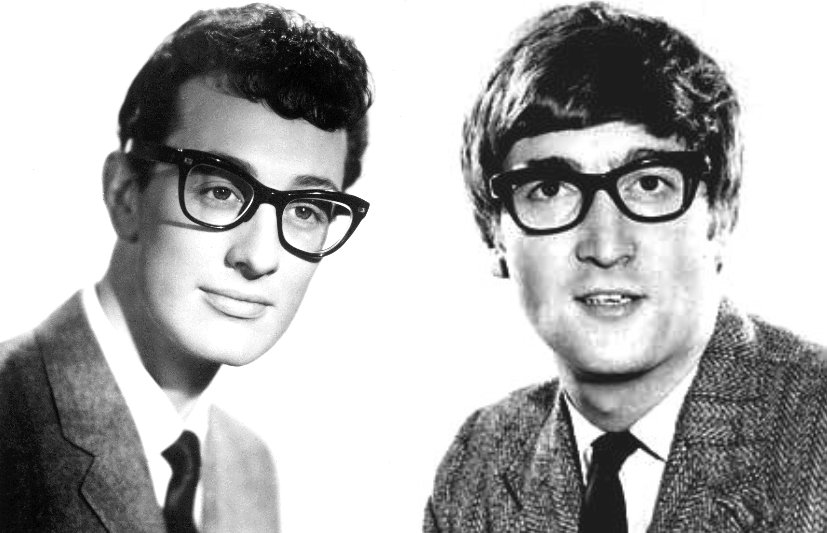
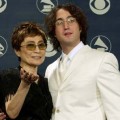
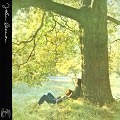
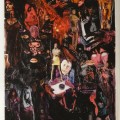
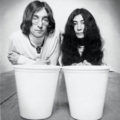
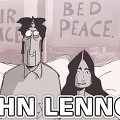
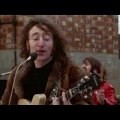
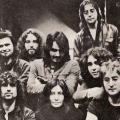
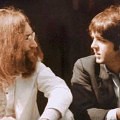
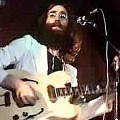
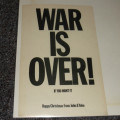
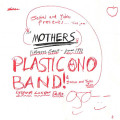
I really enjoyed this. Aside from some of the home movie stuff, which got a little wearing after a while, it was gripping from start to finish and offered a fascinating window into Lennon’s working process and personality. Watching John in the studio it became clear to me why some musicians, George among them, would have found him so much more relaxing to work with (the odd flash of temper aside) than his old songwriting partner. Of course, one man’s control freakery is another man’s search for perfection, but that’s another story. (Anyone else feel any cognitive dissonance during the How Do You Sleep session? ‘Looks like the most laid back recording session ever, but I’d hate to be on the receiving end of that lyric sheet.’)
Two things particularly struck me apart from the encounter with the vet, which was a notable moment for me too. The first was how incredibly positive and forgiving Julian is – I’d thought he was a lot more embittered and it gave me a serious lift to see just how much he’s managed to let go. Guy must have done a lot of inner work.
The other was how utterly disarming John himself is. Throughout his life he was the definition of mercurial, and we have a lot of his bad behaviour on record, but if the film’s anything to go by he spent a lot of his time being sweet, gentle, amazingly open about his emotions and, of course, funny. It’s tempting to think a lot of those qualities died the minute he met Yoko – blame all those earnest interviews – but Above Us Only Sky shows that he always had them in reserve. Of such charm icons are made.
I haven’t watched it, and not sure I want to. I just have a hard time with Yoko. I know, I should let it go (Paul has after all), but after everything I’ve read, and the way she treated Julian, I can’t. I also can’t handle John’s co-dependence and submission to Yoko.
Julian, by the way, recently said on The Beatles Channel on Sirius XM, that the reason he forgave Yoko, was because of Sean. He loves Sean, and wanted a relationship with his brother. I encourage everyone to listen/watch interviews with Julian. What a great, humble, caring person he is.
That’s fascinating Tasmin, just makes me respect Julian even more. After all John’s “therein lies the difference” comments you’d expect a little more Cain-style resentment. Know what you mean about Yoko – I feel about her more or less how I feel about John (on a smaller scale), which is that I like her when I’m watching her and find it hard to reconcile her apparent personality with the incredibly annoying things I know about her.
We are old and don’t have cable or A&E in our house, but I watched some clips on youtube. I wonder whatever became of Mr. Claudio. He’d be in his seventies now. I hope he found peace.
.
I was not surprised to see Mr. Mintz. He will outlive us all, and write the history of the universe for future extraterrestrial explorers of our dead planet. He looked sharp in a shiny purple blazer, black shirt and pants.
.
I’m glad documentaries like this are still being made. The more footage of John being John, the better. Younger generations get to discover his charisma and wit, along with the great songs.
.
On an unrelated note, I just saw a photo of the Beatles with Shirley Temple Black and her daughter, from 1965. Earlier on this blog I wondered if Tallulah Bankhead was the only woman to ever meet both John Lennon AND Robert Benchley, but apparently Shirley Temple also enjoyed that distinction.
You mean “met,” don’t you, Sam? 🙂 [this is a smiley face]
Yesterday, I had a long conversation with a conceptual artist friend about this doc—which I haven’t seen—and her takeaway was that it was very interesting to see Yoko’s impact on John’s creative process.
Interestingly, her opinion was that Yoko Ono will not be remembered as a very great artist, which surprised me, as I know she really likes Yoko’s art (I do as well, mostly). My opinion is that she will be a Warhol-like figure, certainly remembered, but as much for her social impact as for the work. Yoko’s become very important for female artists under 40, and artists of color.
One thing to remember about all Beatles (and John and Yoko in particular) is that they perform for the camera. John’s intent with “Imagine” was to get back in the game—to make a popular album. So any session footage wasn’t for his dotage, it was raw material for a promotional item, and he wanted to show the John he knew fans adored.
He’s always going to be aware of the rolling camera, so you as the viewer should be aware that HE’s aware. Unless the doc shows the seamy stuff we know happened—like Yoko and Klein adding suggestions to “How Do You Sleep?”—take it with the tiniest grain of salt.
Being aware of the rolling camera is an important point. Watching the documentary, I found myself thinking that John and Yoko in particular were reality TV before it was a thing. The mix of public statement and “private” situations that they made was pretty innovative — look at the way they got so much media coverage for the “Bed-In.”
I don’t think being aware of the cameras made them insincere about what they were doing, but the cameras helped shape the way they did it.
Well, the question is, @Nancy, if you think you’re being sincere, but you’re not, are you being insincere?
I’m not just playing semantics; by 1971, John had lived in the fishbowl for almost ten years — his entire adult life. He was habitually on display. That being said I think he (and the other Beatles) had this uncanny gift for being “real” in the midst of alienating celebrity. Then, when he gets with Yoko, I think it gets cranked up even farther, until the question hangs over every act: is this “real”, or giving the people what they want, or giving the people what you THINK they want, or a gambit to push forward an agenda? Does it matter? Can anybody tell? In these terms, a Lost Weekend is almost inevitable, as is early retirement. It’s difficult enough being a person under normal circumstances!
I found this on the steve hoffman blog:
.
“Hi Folks. My name is Ernie Claudio, Curt Claudio was my brother. Curt died in an
Ultralight airplane accident several years after his visit with the amazing John Lennon.
Curt was not a Vet. but he was a straight “A” student at University of California at Davis, California.
Curt started using drugs, dropped out of school. Under the influence of drugs, Curt thought the Beatles were calling him, so traveled to England.
If I remember correctly, George and Ring were in India at the time, and Paul was not accessible.
So Curt ended up on John’s estate, where John treated him with great love and understanding, even letting Curt play in his music room.
Unfortunately, when Curt returned to California, he was upset with John, because Curt thought John had deceived him with his music.”
Oof. After all that — John being extraordinarily decent and kind — the person ended up being upset with John.
Mental illness is no fucking joke.
The whole question of what constitutes sincerity in artistic endeavors is so complex. To create or perform at all, you’ve pretty much got to be selective about what elements of your personality and experiences you present.
I’d put it this way, when it comes to Lennon: I think he deeply wanted to be sincere in his performances, and he was certainly willing to take the risk of exposing himself (literally and figuratively). It does seem inevitable that his bent toward revealing his inner states and his massive celebrity would end up placing enormous pressures on his mental health.
Which goes back to things I’ve said previously on this blog about McCartney: I see him as having created a separation, early on, between his performing and private selves. In my read, McCartney’s performing self can reveal elements of the private self’s experience, but the negotiation between those selves is what’s kept McCartney relatively stable.
I’d agree with all this.
At the risk of saying things I’ve said before on the blog, I think Lennon made a conscious decision in 1968-71 to redefine his celebrity from “pop star” into a political, or even quasi-religious, figure. He did this for a mixture of reasons which included wanting to make a clean break from Paul/Beatles to Yoko/Artist; feeding his ego (he couldn’t get any bigger as a pop star); a Year Zero perception that a lot of people had in the late Sixties; boredom; genuine social conscience; and hubris.
This was a fascinating new choice for someone in Lennon’s position; it’s so incredibly Sixties, and it’s what makes him so fascinating and such an icon of that period. And it was an experiment, which ultimately didn’t work. Maintaining the fundamentally serious public persona necessary for political/religious speech boxed Lennon in psychologically in the ways that a politician or religious leader is, and his Dionysian artist side quite rightly found that impossible to manage over the long haul. Lennon’s creative process relied on a kind of honesty and weirdness and ability to change his mind that politicians and religious figures don’t have. As long as he basically agreed with himself ca. 1968 and was getting a lot of outside energy (publicity, even controversy) he could manage it, but as he changed and the world changed, and his post-Beatles profile declined, there was increasing psychological pressure.
So Lennon went on rumspringa in 1973-75, and then from 75-80 was retired. It’s possible that he would’ve been able to redefine himself again after 1980…but in his last interviews, he’s still sounding a lot like that guy from 1969, a musician determined to be bigger than Jesus. And I think this vision of himself has a lot to do with being Yoko’s partner; changing the world was the project that kept them together as a couple. So I suspect had he lived we would’ve been in store for another period of intense activity, then burnout and disappearance. Or divorce and redefinition as a drug casualty, like he was in 1973-74; or as a genial weirdo, like he was in 1974-75.
McCartney’s relationship to fame is much more conventional, and within those much less ambitious terms, totally successful. Paul has never felt that he needed to be a World Historical Figure; and even his gestures towards politics (I’m thinking vegetarianism) have been personal, not political.
Yes, I think we’re seeing Lennon’s dilemma, and McCartney’s realism (with its resulting strengths and limitations) in similar ways.
.
I think the pressure on Lennon was also exponentially increased by the way he staked his new identity on his and Yoko Ono’s artistic and political couplehood. That’s a lot of intensity for two mere mortals to bear. Making their life itself the artistic statement, as they did in the “Bed-In,” creates a whole new dimension of expectation — from others and, I suspect, from themselves. What do you do when you can’t consistently measure up to the ideal you’ve set (as none of us could?)
.
You said that “As long as [Lennon] basically agreed with himself ca. 1968 and was getting a lot of outside energy (publicity, even controversy) he could manage it,” which I think is a very important observation. “Above Us Only Sky” captures the moment when it was all still working, which makes it particularly moving.
“when it was all still working, which makes it particularly moving”
I’d go farther: it was the last time it really did work, both personally (Lennon’s next LP was the roundly reviled Some Time In New York City) and politically (Imagine was released Fall ’71, and in Fall ’72 Nixon was re-elected in a landslide). Imagine is the last gasp of a particular cycle, the last one in Lennon’s life with Beatles in it. The cycle that came next was very different.
A lot of what made JohnandYoko work was a very particular time, which is why John’s death was so politically charged, and why those two as a couple act as an almost-religious shorthand for many Beatles fans. They represented, and still represent to some, the “personal-as-political,” greater gender equity hopes of the counterculture. I myself would feel this way, had I not read about them.
“It’s possible that he would’ve been able to redefine himself again after 1980…but in his last interviews, he’s still sounding a lot like that guy from 1969, a musician determined to be bigger than Jesus. And I think this vision of himself has a lot to do with being Yoko’s partner; changing the world was the project that kept them together as a couple.”
I think this nails it: to move on from John Lennon, Peace Guru, Former Beatle, and Future Christ to whatever he wanted next (John Lennon, Dad? John Lennon, Maker of Reggae Albums? John Lennon, Painter? John Lennon, Guy Who Lives in the Lake District? John Lennon, Beatle Again?), John would have had to let Yoko go, because that relationship only functioned when both parties were self-mythologizing and trying very, very hard to sell the public on that self-mythologizing. When either person tried to grow or explore something outside of the JohnandYoko myth, it didn’t work. I think they both knew this, and I think that’s why Yoko was looking at a divorce in 1980, and why John was laying on rhetoric we hadn’t heard from him since 1972, particularly thick. Given what we know about how unhappy their marriage was in the late Seventies, it reads almost like a last-ditch effort to bring the fire back (a second honeymoon, if you will)–or a doubling-down on Smacked-Out Jesus, the one identity that Lennon hadn’t foreclosed for himself by being unable to leave Yoko.
“John Lennon, Dad? John Lennon, Maker of Reggae Albums? John Lennon, Painter? John Lennon, Guy Who Lives in the Lake District? John Lennon, Beatle Again?” is one of my favorite chunks of text from this whole blog.
I would’ve really loved to hear Lennon do this with the Maytals:
https://youtu.be/U79o7qwul48
So many of Lennon’s last melodies work well with a reggae beat. He just needed the right musicians behind him.
https://www.youtube.com/watch?v=urM88hLvgUE
I like that! About 1000% more than the original!
Can you imagine?
I wish John had made a stripped down, reggae-fused record in 1980. It sounds from his demoes like it’s the record he wanted to be making, but I think he was too insecure at that point not to aim for the center of the mainstream.
Which demos are you thinking of, precisely?
On my phone, but see, e.g., https://m.youtube.com/watch?v=cJ22gj4pvoY. There’s one for Beautiful Boy, too, I think.
This is an excellent documentary and if the way Yoko treated Julian prevents you from watching it, I’m guessing you’re not much of a fan. Obviously, because Julian is in it. Way to throw the baby out with the bathwater.
As to above comment about John doing something stripped down reggae, it would have been great as during his boat trip through the Bahamas, the reggae really inspired him. Reggae was huge in seventies as was Bob Marley. I have been going through Paul youtubes, demos, etc. and have found several reggae unreleased songs or only in last many years added to albums, like the reggae anti heroin campaign seventies song, Simple As That, and the unreleased Water Spout and the released Linda song Sea side Woman and the very early wings b side C Moon calypso style song with the xylophone. Those varied genres can stretch out an artist and I believe influenced the later New Wave style, not just obvious acts like the B 52s. Much of wings and even possibly eighties Paul bootlegs show reggae calypso hugely influenced him. It would have been interesting to see the results this style imposed over John’s melodies would have worked.
Indeed, some John recorded reggae songs would have been a treat, as he was so inspired by music on his Bahamas boat trip. Going through McCartney bootlegs and demos, I have discovered the reggae Waterspout finally released on pipes of peace cd seventies recorded reggae style anti heroin song, Simple As that. I had kinda Sea Side Woman maxi single and realized C Moon b side of hi, hi hi was calypso.
I forgot to say I saw Julian in the nineties in concert the after his big hit. He came with other multiple acts. Thus, I have seen two Beatles kids.
I’ve written Curt’s remarkable life story, if you’d like more info please go to Homepage Curt Claudio | Finding Claudio Documentary (http://www.findingclaudio.com)